Jew Süss is a film of genre Drama directed by Veit Harlan with Ferdinand Marian
Jew Süss (1940)
Jud Süß
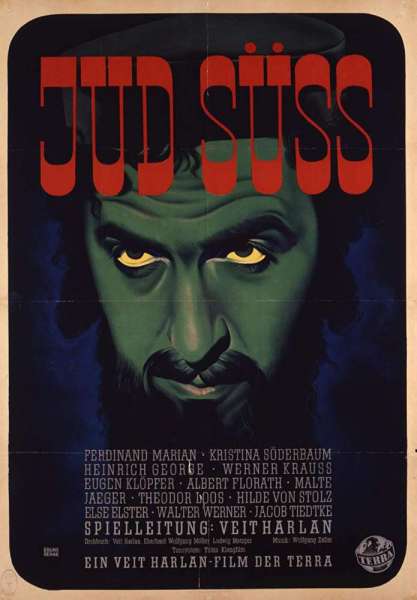
If you like this film, let us know!
- Infos
- Casting
- Technical infos
- Photos
- Videos
- Film quotes
- Characters
- Music
- Awards
Length 1h36
Directed by Veit Harlan
Genres Drama
Themes Politique, Films about religion, Political films, Films about capital punishment, Films about Jews and Judaism
Rating49%










Jud Süß ([juːd sys], "Süss the Jew") is a 1940 Nazi propaganda film produced by Terra Filmkunst at the behest of Joseph Goebbels, and considered one of the most antisemitic films of all time. The movie was directed by Veit Harlan, who wrote the screenplay with Eberhard Wolfgang Möller and Ludwig Metzger. The leading roles were played by Ferdinand Marian and Harlan's wife Kristina Söderbaum; Werner Krauss and Heinrich George played key supporting roles.
The film has been characterized as "one of the most notorious and successful pieces of antisemitic film propaganda produced in Nazi Germany." It was a great success in Germany, with some 20 million viewers. Although the film's budget of 2 million Reichsmarks was considered high for films of that era, the box office receipts of 6.5 million Reichsmarks made it a financial success. Heinrich Himmler urged members of the SS and police to watch the movie.
After the war, some of the leading cast members were brought to trial as part of the denazification process. They generally defended their participation in the film on the grounds that they had only done so under duress. Despite significant evidence to support their arguments, Susan Tegel, author of Nazis and the Cinema, characterizes their postwar attempts to distance themselves from the film as "crass and self-serving". However, she concedes that their motives for accepting the roles seem to have been more driven by opportunistic ambition than by antisemitism. Veit Harlan was the only major movie director of the Third Reich to stand trial for "crimes against humanity". After three trials, Harlan was given a light sentence because he convinced the courts that the antisemitic content of the film had been dictated by Goebbels and that Harlan had worked to moderate the antisemitism. Eventually, Harlan was reinstated as a citizen of the Federal Republic of Germany and went on to make nine more films. He remained a controversial figure and the target of protests.
Together with Die Rothschilds and Der ewige Jude, both released in 1940, the film remains one of the most frequently discussed examples of the use of film to further the Nazi antisemitic agenda. In 2010, two documentary films were released that explore the history and impact of this movie.
Synopsis
The film begins with the coronation of Karl Alexander, Duke of Württemberg (Heinrich George), a man much beloved by his people, who swears an oath to obey the laws of the dukedom "according to the traditional Württemberg loyalty and honesty." However, the Duke soon becomes frustrated because the Württemberg Diet (the provincial council) refuses him the funds needed to maintain a lifestyle comparable to his neighboring sovereigns; in particular, he wants a personal bodyguard, an opera company, and a ballet company. Lacking funds even to purchase coronation gifts for the Duchess (Hilde von Stolz), the Duke sends a courtier to Frankfurt to borrow money from Joseph Süß Oppenheimer (Ferdinand Marian). Süß shows the emissary jewels and jewelry that are obviously beyond the Duke's means and then says that it would be his honor to provide the Duke with jewelry at a substantial discount. However, Süß insists on presenting the items to the Duke personally despite a ban against Jews (Judenbann) entering the city that has been in force for over a century. Armed with a pass from the Duke, Süß cuts his hair, shaves his beard, and dons "Christian" clothes so that he can enter Württemberg disguised as a Christian. As his carriage gets into an accident, Süß gets a lift from Dorothea Sturm (Kristina Söderbaum) to the city.Actors

Ferdinand Marian
(Joseph Süß Oppenheimer)

Werner Krauss
(Rabbi Loew)
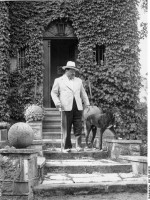
Heinrich George
(Karl Alexander, Herzog von Württemberg)
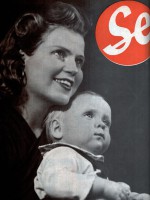
Kristina Söderbaum
(Dorothea Sturm)
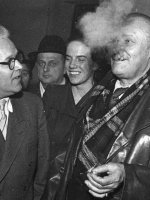
Eugen Gottlob Klöpfer
Comments
Leave comment :
Suggestions of similar film to Jew Süss
There are 128 films with the same actors, 17 films with the same director, 60579 with the same cinematographic genres, 10381 films with the same themes (including 0 films with the same 5 themes than Jew Süss), to have finally 70 suggestions of similar films.If you liked Jew Süss, you will probably like those similar films :

The Golden City (1942)
Directed by Veit Harlan
Genres Drama
Themes Politique, Political films
Actors Kristina Söderbaum, Eugen Gottlob Klöpfer, Annie Rosar, Kurt Meisel, Dagny Servaes, Rudolf Prack
Rating60%





Anna, a young, innocent country girl (a Sudeten German), whose mother drowned in the swamp, dreams of the golden city of Prague. After she falls in love with a surveyor, she runs away to Prague to find him. She is instead seduced and abandoned by her cousin (a Czech). She attempts to return home, but her father rejects her, and she drowns herself in the swamp where her mother died.

Burning Hearts (1945)
, 1h50Directed by Veit Harlan
Genres Drama, War, Historical, Romance
Themes Politique, Political films, Histoire de France, Napoleonic Wars films, French Revolution films
Actors Kristina Söderbaum, Heinrich George, Paul Wegener, Gustav Diessl, Horst Caspar, Claus Clausen
Rating59%





The film begins in 1813 after the phase of the Napoleonic Wars known in German as the Befreiungskriege (War of Liberation). The opening scenes show Prussian Landwehr and volunteers marching down the streets of Breslau through enthusiastic crowds. This is followed by a dialogue between King Frederick William III of Prussia and Count August von Gneisenau, in which Gneisenau explains that the siege of Kolberg taught the importance of citizen armies. Ending with the admonition that kings who cannot lead must abdicate, the scene switches to Vienna in 1806 to show the abdication of the last Holy Roman Emperor, Francis II of Austria, whom the script has Gneisenau call "an Emperor who abandoned the German people in their hour of need".

The Great King (1942)
, 1h58Directed by Veit Harlan
Genres Drama, War, Historical
Themes Political films, Films about royalty
Actors Otto Gebühr, Kristina Söderbaum, Gustav Fröhlich, Hans Nielsen, Hilde Körber, Paul Wegener
Rating68%






The Immortal Heart (1939)
, 1h47Directed by Veit Harlan
Origin German
Genres Drama, Historical
Themes Théâtre, Films based on plays
Actors Heinrich George, Kristina Söderbaum, Auguste Prasch-Grevenberg, Paul Wegener, Raimund Schelcher, Michael Bohnen
Rating68%





Ce film raconte la vie quelque peu romancée de Peter Henlein, un serrurier et horloger de Nuremberg à la fin du XV et du début du XVI siècle, souvent considéré comme l'inventeur de la montre, dite "L'œuf de Nuremberg", même si cela est discuté. Il s'agit de l'apologie d'une vie d'humanité, de conscience et de labeur.

The Journey to Tilsit (1939)
, 1h30Directed by Veit Harlan
Genres Drama
Actors Kristina Söderbaum, Philip Dorn, Albert Florath, Eduard von Winterstein, Anna Dammann, Wolfgang Kieling
Rating68%





Elske faithfully loves her husband Endrik as he is seduced by a foreign schemer, Madlyn. Madlyn persuades him to murder Elske and run off with her. He lures Elske into the boat as a prelude to drowning her, but is unable to carry it out. When they reach the shore, she flees to the city, and he follows to plead for forgiveness. They return, and a storm blows up while they are in the boat. Endrik gets ashore, but believes Elske to have drowned. He reacts with anger to Madlyn, but learns that Elske did survive.

Immensee (1943)
, 1h28Directed by Veit Harlan
Genres Drama, Romance
Themes Films about music and musicians
Actors Kristina Söderbaum, Carl Raddatz, Otto Gebühr, Germana Paolieri, Vadim Glowna, Max Gülstorff
Rating64%





Elisabeth (Kristina Söderbaum) falls in love with Reinhardt (Carl Raddatz), but he leaves their native village to study music, travel the world and build his career as a composer. His most important compositions are inspired by his love for her, Twelve Songs of Elisabeth and Seerosen (water lilies, the couple's special flower), but after she visits him on the day of his final examination at the conservatoire and finds a strange woman asleep in his bed, Elisabeth marries Erich (Paul Klinger), the wealthy heir to the estate of Immensee. Reinhardt returns to win her back, and Erich releases her, telling her that all that he wants is for her to be happy. This causes Elisabeth to realise what love really means and she tells Erich for the first time that she loves him, and remains with him. In the frame story, many years have passed, Erich is dead and Elisabeth and Reinhardt, who is now a renowned composer, meet for tea at his hotel after a performance of his Seerosen; at the end of the film, she tells him she will remain true to Erich and to Immensee, and he leaves for the last time.
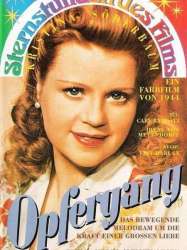
The Great Sacrifice (1944)
Directed by Veit Harlan
Genres Drama, Romance
Actors Carl Raddatz, Kristina Söderbaum, Franz Schafheitlin, Ernst Stahl-Nachbaur, Otto Tressler, Ludwig Schmitz
Rating66%





Albrecht Froben, though married to Octavia, falls in love with his neighbor, Äls Flodéen. She, however, is slowly dying from a debilitating disease. During an epidemic, Albrecht goes to bring her daughter to safety but he catches typhoid and is quarantined in hospital. Octavia, realising the love match, and hearing that Als is now bedridden and dying, dresses up as him and rides by her gates every day to keep her spirits up - her bed is next to the window. Albrecht returns. Äls has a dream in which she talks to her projection of Albrecht and concludes that she does not wish to take part in this union and accepts death. Albrecht is reconciled with his wife.

Hanna Amon (1951)
Directed by Veit Harlan
Genres Drama
Themes Films about families
Actors Kristina Söderbaum, Lutz Moik, Ilse Steppat, Hedwig Wangel, Wolf Ackva, Franz Schafheitlin
Rating59%





Hanna and her brother Thomas Amon live on the estate of their deceased parents. While Hanna of local veterinary and Thomas Brunner of the mayor's daughter is secretly admired and sought after, the siblings have eyes only for each other. Thomas, however, forfeited the much older, seductive Vera Colombani, a castle owner. He follows her (his sister, defying the warnings) to the south, where they spend the winter. Thomas is dropped in the wake of the Colombani and returns repentant return to the home farm. But when he meets again with his former lover, he triggers a disaster the Colombani and eventually fall victim to Hanna.

Covered Tracks (1938)
, 1h21Directed by Veit Harlan
Genres Drama, Crime
Actors Kristina Söderbaum, Philip Dorn, Heinrich Schroth, Friedrich Kayßler, Paul Dahlke, Leo Peukert
Rating68%





Séraphine arrive avec sa mère à Paris pour visiter l'Exposition universelle. Elles doivent loger dans deux hôtels différents. Le lendemain, lorsqu'elle vient retrouver sa mère, celle-ci a disparu, et c'est comme si elle n'avait même pas été à l'hôtel du tout...
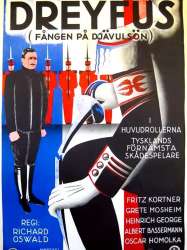
Dreyfus (1930)
, 1h55Directed by Richard Oswald
Origin German
Genres Drama, Biography, Historical
Themes Spy films, Prison films, Films about racism, Films about religion, Films about capital punishment, Films about Jews and Judaism
Actors Fritz Kortner, Grete Mosheim, Heinrich George, Albert Bassermann, Oskar Homolka, Ferdinand Hart
Rating63%





En septembre 1894, le service de renseignement français prend connaissance d'un incident d'espionnage à Paris. Des secrets militaires auraient été transmis à l'attaché militaire allemand à Paris, Maximilian von Schwartzkoppen. « Dans l'intérêt de l'armée », dit-on, le ministre de la Guerre Auguste Mercier doit rapidement trouver un coupable. Le 15 octobre de la même année, Alfred Dreyfus, capitaine au sein de l'état-major, d'origine juive, né en Alsace, jusqu'alors totalement innocent, est arrêté sur la base d'éléments de preuve légèrement construits. L'agitation antisémite dans la presse, l'armée et la politique crée rapidement un chaudron contre le traître présumé à Paris dans les années 1890.
 Connection
Connection